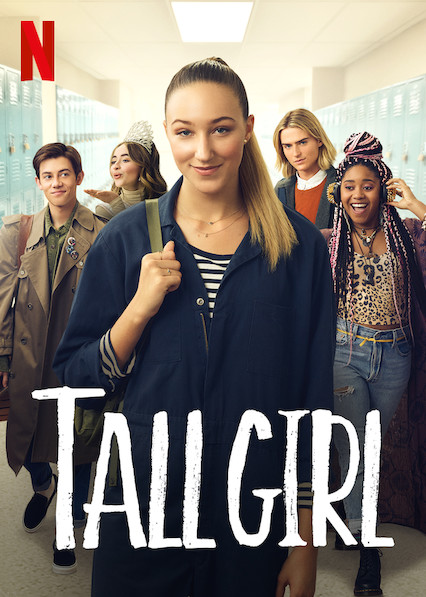
By Sarah Khan
★★
“Tall Girl,” a Netflix Original romantic comedy, was released on Sept.13. The movie,directed by Nzingha Stewart, stars Ava Michelle as Jodi Kreyman, Sabrina Carpenter as HarperKreyman, Anjelika Washington as Fareeda, and Luke Eisner as Stig Mohlin. Prior to its release,the trailer alone raised controversy.
The basic premise of the movie’s plot revolves around the main character, Jodi, and her grievances of being a 6’1 tall high schooler — aka, the “Tall Girl”. While the film, which is meant to be about self-acceptance and embracing differences, had good intent, its execution left many viewers upset.
The film begins with a girl and a boy making flirtatious eye contact with each other at the library. The girl, Jodi, begins to discuss a book’s character being alienated from society, which foreshadows the conflict of the movie about Jodi feeling alienated herself. The boy is about to ask her out on a date, but leaves promptly after she stands up and he sees how tall she is. Jodi Continues to have encounters similar to this throughout the movie, and she is often teased for her height by her peers.
The movie portrays a wealthy white girl’s insecurity about her height as the image of adversity, which isn’t the best way to reach an audience that most likely won’t be able to relate.Additionally, this poor choice of representation undermines the struggles of minorities and underprivileged people who have faced comparably worse circumstances.
Of course, just because people have had it worse doesn’t mean Jodi’s insecurities aren’t valid. However, it is hard to resonate with Jodi’s character because of how satirical and dramaticized her characterization is. Her entire personality revolves around her height, which makes her seem one-dimensional. Jodi is introduced as self-centered, as she believes her life is much harder than the rest of her peers. Only at the end of the movie does she display some character development when she goes up in front of her classmates at a school dance and proclaims that there is more to her than just being the “Tall Girl”.
The film missed an opportunity for some redemption with the limited characterization of Fareeda, who’s main role in the movie was to be Jodi’s supportive sidekick. Fareeda is one of the few relevant characters who is a person of color, yet the movie never discusses any of her experiences. If it had, it is possible that the movie overall would have been regarded less negatively. Additionally, the school the movie is set in is called “Ruby Bridges High School,”named after Ruby Bridges, a civil rights activist who was one of the first African American Children to attend an all white school during the fight for desegregation. For a film that is supposed to be about facing adversity, it’s questionable that they didn’t mention the historical significance behind the name of the school.
Besides the issue of the lack of representation, the plot of the movie is also cliché and predictable. The concept of this movie, which is of an underdog being made fun of by the mean popular kids, meeting a love interest, and then suddenly getting an awakening which allows her to conquer her insecurity and get a happy ending, is overused and cliche. “Tall Girl” didn’t bring anything new to the table, and overall it was dissatisfying because of its subpar plot and lack ofPOC representation. Despite its being a Netflix Original, it fails to provide originality

